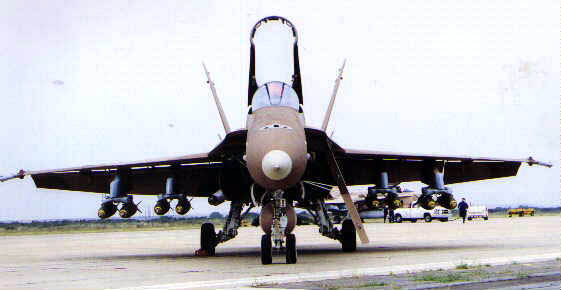|
Mk. 82 500 lb. Bomb
by Dave Roof
|
 |
|
Mk. 82 500 lb. Bombs
fitted to an F/A-18A from VMFA-134 'Smoke' of MAG-46 at MCAS
Miramar. |

HyperScale is proudly supported by Squadron
The photos on this page might help any modelers who are planning to load
Mk.82 500 lb. bombs on their aircraft.
The title photo shows an F/A-18A from VMFA-134 'Smoke' of MAG-46 at MCAS
Miramar.
I was attached to VMFA-134 from October 1995 to June 1998. The aircraft were
transferred to our squadron from VFC-13 and to this day retain the wraparound
brown camouflage scheme. Also note that the aircraft is loaded with 'Live' bombs
for a peacetime training mission.
By examining the photos, you will notice that there are no rules for the
colors used on any particular bombs and/or their components. The bombs can be a
very dark Olive Drab (as seen in the Desert Storm bombs) or a light Field Green
(as seen in the Miramar bombs), to Grey.
Click the thumbnails below to view
the images full-sized.
Use your browser's Back Arrow to return to this page:
 |
Photo 1: Here is
how the Mk 82 comes from the factory. The fins, boosters, fuzes, etc., are
installed by Intermediate Level Ordnancemen. These particular bombs have
nose plugs installed and are in the new Grey TPS scheme. |
 |
Photo 2: Taken
in November 2000 at WTI (Weapons Training Instruction) in Yuma, AZ. This
photo shows three Mk 82's with Boosters and MK 15 'Snakeye' fins installed.
Contrary to what most believe, the MK 15 fin is still in use by the Marine
Corps. The Fuzes are not installed until the bomb is on the aircraft. |
 |
Photo 3: Side
view of the bomb with Snakeye fin. *Note that these bombs are NOT thermally
protected. |
 |
Photo 4: Detail
shot of the Mk 15 fin. The fin is attached to the bomb by way of 8 set
screws around the circumference of the fin. |
 |
Photo 5: Mk 82
with nose plug and BSU-86 retarded fin on station 2 of an
F/A-18. The BSU-86 replaced the Mk 15. However, there are still numerous
-15's in the inventory and they will continue to be used until stocks are
depleted. |
 |
Photo 6: Side
view of the Mk 82 attached to the pylon on station 3. The pylon is the
SUU-63, while the bomb rack is the BRU-32. The White and Red cables near the
top center of the bomb is the Mk 122 electrical safety switch. This switch
is used on USN/USMC aircraft only and screws into a well located between the
two suspension lugs. In layman's terms, the switch provides electrical power
to the electric tail fuze. This photo was taken at MCAS Miramar. |
 |
Photo 7: This
photo shows two Mk 82's loaded on a BRU-33 VER (vertical ejector rack). The
square holes in the nose plugs are where we install a 3/8 drive ratchet used
to tighten the plugs. |
 |
Photo 8: Close
up shot of a M904 nose fuze. *Note the arming wire is not
attached directly to the fuze, but instead to a clip that attaches to the
fuze. |
 |
Photo 9: Side
shot of the bombs attached to a VER. The arming wire is attached to the rear
suspension lug of the bomb. It passes through a ring (visible directly in
front of the forward sway brace) that is attached to the bomb rack. When the
bomb is dropped, the wire stays with it. *Note the position of the VER in
relation to the pylon. |
 |
Photo 10: Three
Mk 82's with M904 fuzes and BSU-86 fins. |
 |
Photo 11: Head
on shot showing the two inboard bombs to good effect. Also note that these
are loaded onto a BRU-33A/A CVER. The CVER is wider and the bomb racks are
angled outwards, as opposed to the standard VER, which is narrower. Compare
this to the VER in photo 7. |
 |
Photo 12: A
trailer full of Thermally Protected Mk 82's with conical fins and Mk 43
TDD's installed in the nose. This photo was taken in Bahrain during
Operation Desert Storm. The Mk 43 is a sensing fuze. It puts out a signal as
the bomb is dropped. Once that signal is bounced back by a target, a signal
is sent to the tail fuze which detonates the bomb, giving it an air burst
capability. |
 |
Photo 13: Here
is a trailer full of Thermally Protected Mk 82's with BSU-86's installed.
This photo was also taken during Desert Storm. Here, you can see the Mk 122
safety switch to good effect. |
Text & Images Copyright © 2001 by Dave
Roof
Page Created 21 April, 2002
Last Updated
19 April, 2004
Back to Reference Library
|
Home |
What's New |
Features |
Gallery |
Reviews |
Reference |
Forum |
Search